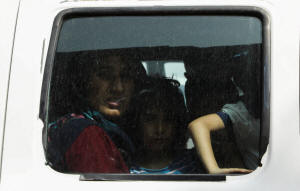Air strikes hit Khartoum as seven-day ceasefire approaches
 Send a link to a friend
Send a link to a friend
 [May 22, 2023]
By Khalid Abdelaziz and Mohamed Nureldin [May 22, 2023]
By Khalid Abdelaziz and Mohamed Nureldin
KHARTOUM (Reuters) - Sudan's army conducted air strikes in the capital
Khartoum on Monday, residents said, seeking to win ground against its
paramilitary rivals hours before a week-long ceasefire aimed at allowing
delivery of aid was due to take effect.
The army also carried out air strikes into the evening on Sunday,
witnesses said, targeting vehicles from mobile units of the paramilitary
Rapid Support Forces (RSF) that have been operating across residential
areas in the capital since the conflict between the two military
factions erupted on April 15.
Both sides have said they will abide by a ceasefire starting at 21:45
local time (19:45 GMT). Though fighting has continued through previous
ceasefires, this is the first truce to be formally agreed following
negotiations.
The ceasefire deal includes a monitoring mechanism involving the army
and the RSF as well as representatives from Saudi Arabia and the United
States, which brokered the agreement after talks in Jeddah.
The deal has raised hopes of a pause in a war that has driven nearly 1.1
million people from their homes, including more 250,000 who have fled
into neighbouring countries, threatening to destabilise a volatile
region.

On Monday, residents reported air strikes in Khartoum, Omdurman and
Bahri, the three cities that make up the greater capital, separated by
the confluence of the Blue Nile and White Nile. They also said clashes
could be heard in central Khartoum.
The army has struggled to dislodge the RSF from strategic positions in
central Khartoum and from neighbourhoods where it has occupied civilian
buildings. The RSF, which has its roots in the feared militias that
fought with the government in Darfur, is adept at ground fighting, while
the army has depended largely on air strikes and heavy artillery.
TRAPPED
More than five weeks of fighting in Khartoum has trapped millions in
their homes or neighbourhoods.
[to top of second column]
|

Syrian kurds, who were evacuated from
Sudan, arrive in Kurdish-controlled city of Qamishli, in northern
Syria May 22, 2023. REUTERS/Orhan Qereman

Residents have reported worsening lawlessness and looting, as well
as crippling power and water cuts. Supplies of food have been
running low in some areas, and most hospitals have ceased to
operate.
The agreement brokered in Jeddah is focused on allowing in aid and
restoring essential services. Mediators say further talks would be
needed to seek the removal of forces from urban areas to broker a
permanent peace deal with civilian involvement.
The war erupted in Khartoum amid plans for army chief Abdel Fattah
al-Burhan and RSF commander Mohamed Hamdan Dagalo to sign up to a
new political transition towards elections under a civilian
government.
Burhan and Hemedti took the top positions on Sudan's ruling council
after the overthrow of former leader Omar al-Bashir during a popular
uprising in 2019, sharing power with civilian groups.
In 2021, they staged a coup as a deadline to hand leadership of the
transition to civilians approached.
Since last month, fighting has also flared in the western region of
Darfur, already scarred by two decades of conflict and unrest that
continued despite a peace deal with some groups in 2020.
Some 705 people have been killed across Sudan and at least 5,287
injured, according to the World Health Organization, though the true
death toll is believed to be much higher.
(Reporting by Khalid Abdelaziz in Dubai, Mohamed Nureldin in
Khartoum, Adam Makary in Cairo; Writing by Aidan Lewis; Editing by
Christina Fincher)
[© 2023 Thomson Reuters. All rights
reserved.]This material may not be published,
broadcast, rewritten or redistributed.
Thompson Reuters is solely responsible for this content. |